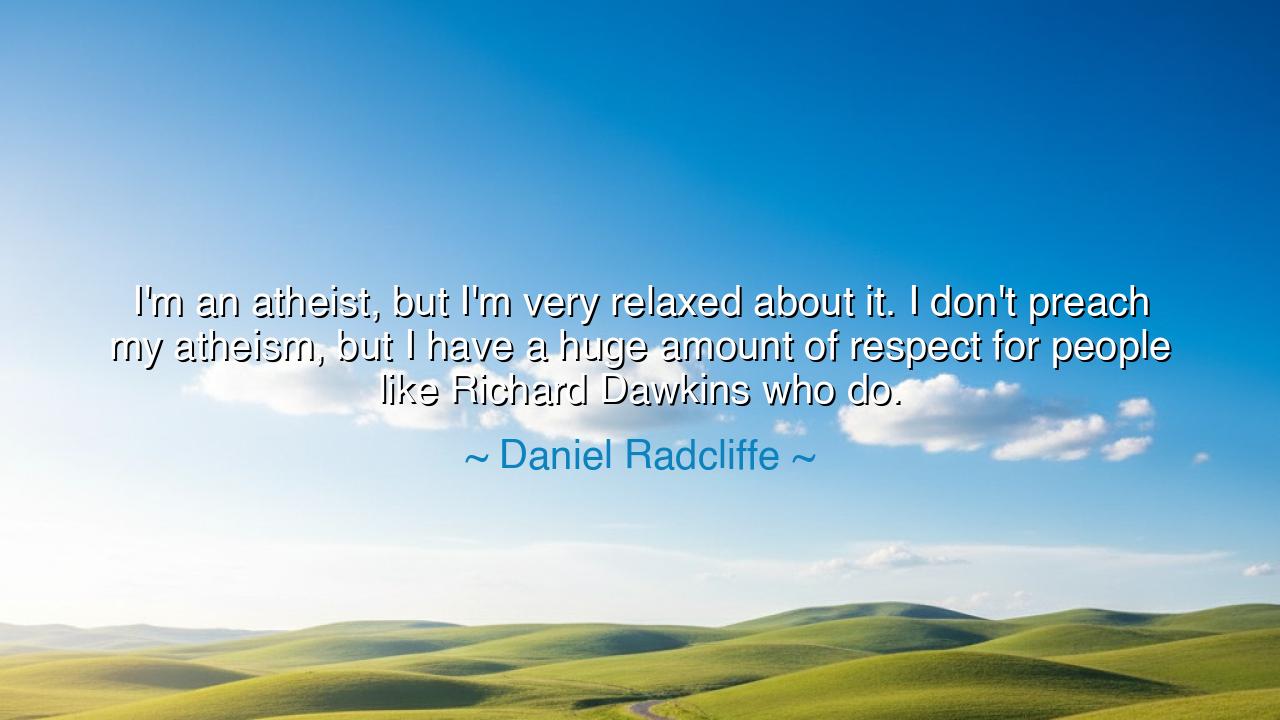
I'm an atheist, but I'm very relaxed about it. I don't preach my
I'm an atheist, but I'm very relaxed about it. I don't preach my atheism, but I have a huge amount of respect for people like Richard Dawkins who do.






Hearken to the words of Daniel Radcliffe, whose reflection illuminates the delicate balance between conviction and respect. He confesses, “I’m an atheist, but I’m very relaxed about it,” revealing a disposition of humility and openness. He does not preach his atheism, yet he expresses a huge amount of respect for people like Richard Dawkins who do. In these words lies an ancient truth: wisdom is not measured solely by the strength of belief, but by the capacity to honor the convictions of others, to engage in discourse without enmity, and to recognize courage where it manifests.
Since the earliest days of human thought, philosophers have debated matters of divinity, morality, and the cosmos. Socrates, who drank from the hemlock, was accused of impiety, yet he approached truth with reverence for reason and dialogue. His manner was neither coercive nor disdainful, but rooted in inquiry and respect. Radcliffe’s perspective echoes this Stoic principle: one may hold firm beliefs—or none at all—without diminishing the dignity of those who hold differently.
Consider the story of Voltaire, the French sage whose critique of religion and advocacy for freedom of thought were fearless, yet grounded in a commitment to civil coexistence. He championed reason, often challenging dogma, yet he also insisted on tolerance, famously declaring, “I disapprove of what you say, but I will defend to the death your right to say it.” Radcliffe mirrors this ethos: personal conviction need not be imposed, and respect for the bold expression of belief—such as Dawkins’ outspoken atheism—is itself a mark of wisdom.
Radcliffe’s acknowledgment of Dawkins highlights the courage required to preach one’s convictions. Not all are willing to confront societal norms or challenge entrenched beliefs. To voice atheism publicly, especially in a world still bound by faith traditions, demands fortitude and clarity of purpose. Respecting such courage, even when it does not align with one’s own method of expression, exemplifies a virtue the ancients revered: admiration for moral and intellectual bravery.
In a broader sense, Radcliffe’s statement teaches that harmony is achieved not by uniformity, but by mutual respect across difference. One may be atheist or theist, skeptic or believer, yet the quality of discourse, of engagement, and of coexistence rests upon honoring the integrity of others’ choices. Just as philosophers in Alexandria debated ideas without violence, modern wisdom encourages the exercise of conviction with civility.
The lesson emerges clearly: hold your beliefs with honesty, but temper them with humility. Allow others the space to express their truths, even boldly, and recognize the courage inherent in doing so. This equilibrium nurtures understanding, minimizes conflict, and fosters a society in which reason, dialogue, and conscience can flourish together.
Practical guidance flows naturally: speak your truth when appropriate, yet refrain from coercion. Listen with attentiveness, observe with respect, and engage in discourse that values the dignity of all participants. Whether one preaches loudly, quietly, or not at all, the measure of wisdom lies in the balance between conviction and respect.
Thus, heed the reflection of Daniel Radcliffe: conviction need not impose, and skepticism need not belittle. In cultivating calm honesty about one’s beliefs, while honoring the courage and expression of others, one achieves a harmony that transcends ideology. Let this temper the voice of the modern thinker, guiding us toward a society of understanding, respect, and enduring intellectual courage.






AAdministratorAdministrator
Welcome, honored guests. Please leave a comment, we will respond soon